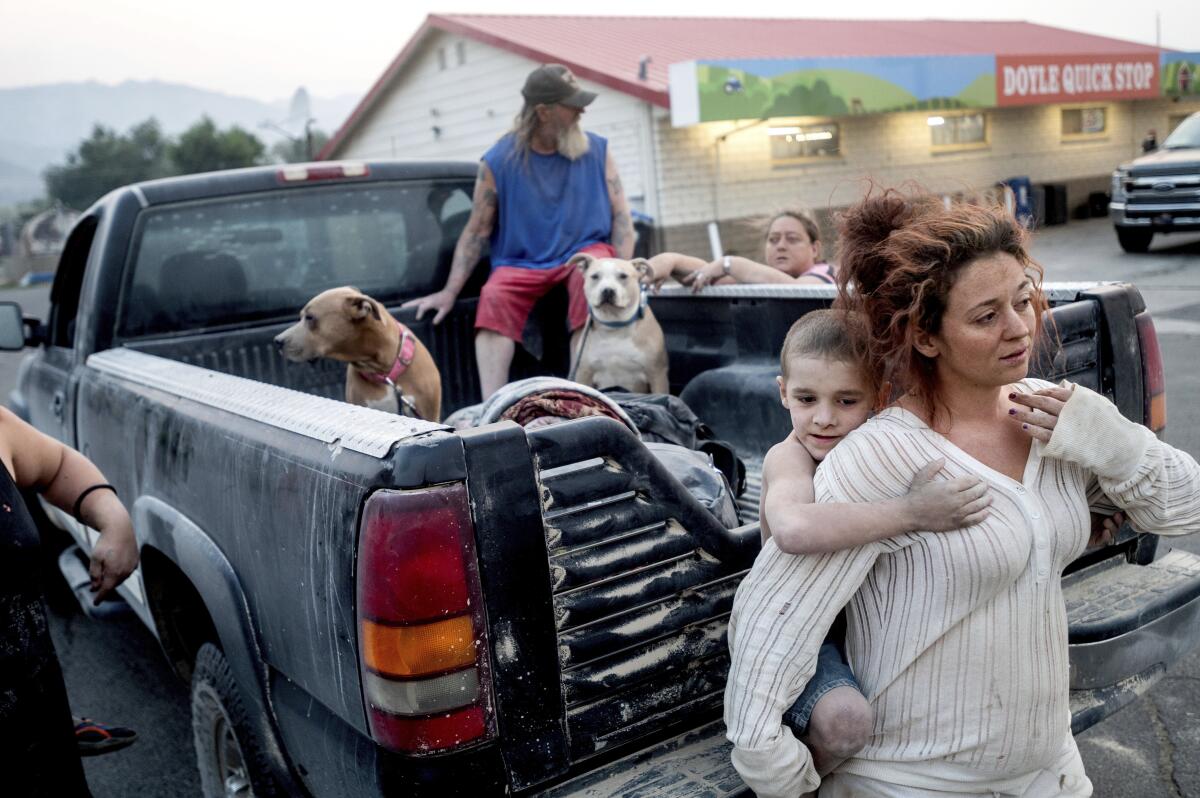Victims of Dixie fire sue PG&E, whose equipment is suspected of sparking the massive blaze

- Share via
Victims from the nearly 1 million-acre Dixie fire still burning in Northern California have sued Pacific Gas & Electric amid suspicions that the utility’s equipment may have sparked the blaze that has reduced more than 1,300 homes to rubble.
A pair of suits filed this week against the utility on behalf of more than 200 people allege the utility’s power line not only started the massive fire two months ago in the dense forest of Plumas County but that PG&E was well aware that the conditions were ripe for such a disaster.
Filed in Superior Courts in Shasta County and San Francisco, where PG&E is headquartered, the complaint alleges the utility’s “ineffective vegetation management programs, unsafe equipment and aging electrical infrastructure created a predictable risk” that its electrical equipment would ignite a fire like the Dixie blaze.
Gerald Singleton, an attorney for the victims, estimates that the blaze — the second-largest in California history — has affected thousands, from those who lost multigenerational homes to others whose businesses were destroyed.
“The loss of memories, cherished possessions, things like that just can’t be replaced, but we can through the system at least compensate them for their economic losses,” Singleton said of his clients.
PG&E said in a statement that its “most important responsibility is the safety of our customers and the communities we serve,” adding that it had not received notification of a lawsuit.
The utility has said its equipment may have sparked the massive Dixie fire, which broke out July 13 near where a Douglas Fir fell into a power line near the origin of the fire in Feather River Canyon. It took a worker about 10 hours to reach the remote site and observe flames, company officials said. PG&E equipment nine days later may have ignited the Fly fire, a blaze that eventually merged with the Dixie fire, as well as a separate wildfire in Magalia that was extinguished at a quarter-acre July 14.
PG&E said the California Department of Forestry and Fire Protection is investigating the cause of the Dixie fire, and has not made a determination. The utility said it had not been able to review evidence collected by the agency. The monstrous blaze has seared more than 960,000 acres and is 86% contained.
“We remain focused on reducing wildfire risk across our service area, and are committed to doing everything we can to keep our customers and communities safe,” the utility said.
A federal judge recently questioned the worker who responded to the incident that mushroomed into the Dixie blaze, inquiring why he didn’t consider shutting off power to the line while investigating the cause of the outage that occurred in a high-fire-risk area.
“Wouldn’t it have been the prudent thing to do to turn that power off in case there was a tree on the line?” U.S. District Judge William Alsup, who oversees PG&E’s criminal probation in another case, asked during a hearing this week.
Singleton said the decision not to cut the power was “clearly negligence.”
“That is not what he should have done and as a result you have a catastrophic amount of damage,” Singleton said.
Singleton Schreiber McKenzie & Scott has helmed other wildfire liability suits stemming from several fires that have singed millions of acres in California in recent years.
Singleton said he believes more victims of the Dixie fire will come forward and additional suits will be filed by other firms.
More to Read
Sign up for Essential California
The most important California stories and recommendations in your inbox every morning.
You may occasionally receive promotional content from the Los Angeles Times.









